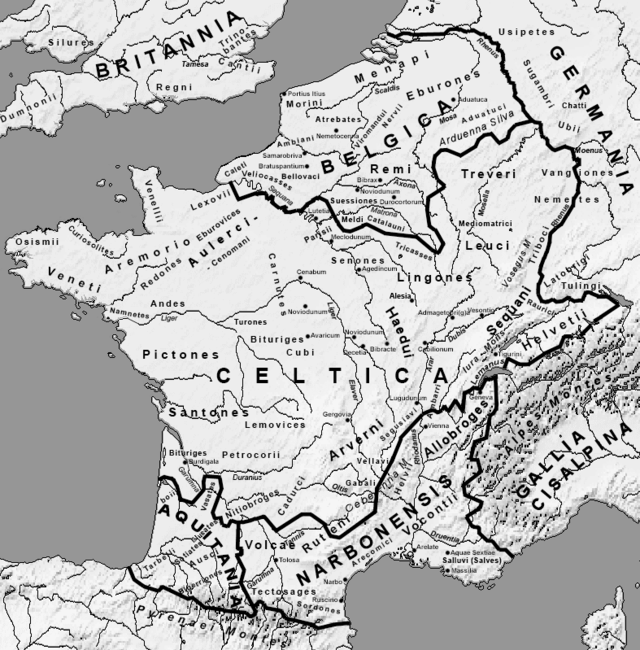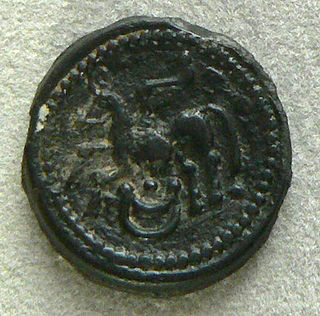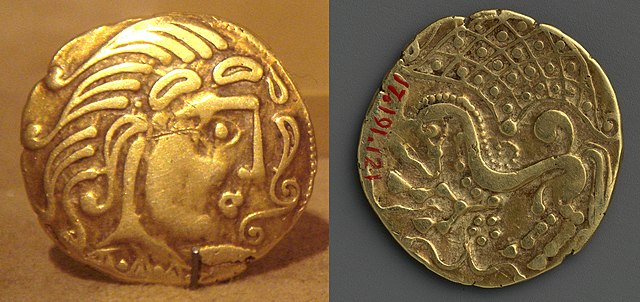Top Qs
Timeline
Chat
Perspective
Parisii (Gaul)
Gallic tribe From Wikipedia, the free encyclopedia
Remove ads
The Parisii (Gaulish: *Parisioi; Greek: Παρίσιοι, romanized: Parísioi) were a Gallic tribe that dwelt on the banks of the river Seine during the Iron Age and the Roman era. They lived on lands now occupied by the modern city of Paris, that name a derivation of their ethnonym.





Remove ads
Name
They are mentioned as Parisii by Caesar (mid-1st c. BC),[1] Parísioi (Παρίσιοι; var. Παρήσιοι) by Strabo (early 1st c. AD) and Ptolemy (2nd c. AD),[2] Parisi by Pliny (mid-1st c. AD),[3] and as Parisius and Parisios in the Notitia Dignitatum (5th c. AD).[4][5] Another tribe named Parisii is also documented (with only one attestation) in Britain.[6]
The ethnic name Parisii is a latinized form of Gaulish Parisioi (sing. Parisios). Its meaning has been debated. According to French government diplomat Xavier Delamarre, it may derive from the stem pario- ('cauldron').[6] Alfred Holder interpreted the name as 'the makers' or 'the commanders', by comparing it to the Welsh peryff ('lord, commander'), both possibly descending from a Proto-Celtic form reconstructed as *kwar-is-io-.[7] Alternatively, Pierre-Yves Lambert proposed to translate Parisii as the 'spear people', by connecting the first element to the Old Irish carr 'spear', derived from an earlier *kwar-sā.[5]
The city of Paris, attested as Lutetiam Oppidum Parisiorum by Caesar (Parision in the 5th c. AD, Paris in 1265), is named after the Gallic tribe.[8][5]
Remove ads
History
The Parisii settled in the territory surrounding their chief town (or oppidum) about 250 BC, as first mentioned in Julius Caesar's Commentarii de Bello Gallico.[9]
According to the Commentarii de Bello Gallico, when the Romans under Caesar entered this territory, the Parisii started burning down their own towns for they were willing to give up these possessions rather than have them taken by the Romans.[10]
In 52 BC, in concert with the Suessiones, the Parisii participated in the general rising of Vercingetorix against Julius Caesar. Before the Roman period, the Parisii had their own gold coinage.[10]
Once part of the Roman Empire the Parisii oppidum later became the site of Lutetia, an important city in the Roman province of Gallia Lugdunensis, and ultimately the modern city of Paris, whose name is derived from the name of the tribe. An ancient trade route between Germania and Hispania existed at the area, by way of the meeting of the Oise and Marne rivers with the Seine.[11][12]
Remove ads
See also
- Iron Age of North Europe
- List of peoples of Gaul
- Paris
- Parisi (Yorkshire), tribe of similar name in East Yorkshire, UK, possibly associated with the Parisii of Gaul
- Treasure of Puteaux, Gallic coins discovered at Puteaux, Hauts-de-Seine, France and most of the coins are from the Parisii tribe.
References
Bibliography
Further reading
External links
Wikiwand - on
Seamless Wikipedia browsing. On steroids.
Remove ads
